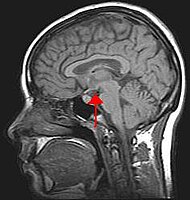
Photo from wikipedia
Leptin, the adipocyte-derived hormone identified in 1994 for its major role in the control of satiety and body weight regulation, is an adipokine secreted in a sex-specific manner. Although it… Click to show full abstract
Leptin, the adipocyte-derived hormone identified in 1994 for its major role in the control of satiety and body weight regulation, is an adipokine secreted in a sex-specific manner. Although it has clearly been established that females secrete three to four times more leptin than males and that this sexual dimorphism in leptin secretion is exacerbated with overweight and obesity, the origin and the physiological consequences of this sexual dimorphism remain ill-defined. The adipose tissue is the major site of leptin secretion; however, leptin receptors are ubiquitously expressed, conferring to leptin, and indirectly to the adipose tissue, a potential role in the control of numerous physiological functions. Besides its major role in the control of food intake and energy expenditure, leptin has been shown to contribute to the control of immune, bone, reproductive, and cardiovascular functions. The goal of the present chapter is to review and discuss the current knowledge on the contribution of leptin to the control of cardiovascular function while focusing on the impact of the sexual dimorphism in leptin secretion and of the pathological increases in leptin levels induced by overweight and obesity.
Journal Title: Advances in Experimental Medicine and Biology
Year Published: 2017
Link to full text (if available)
Share on Social Media: Sign Up to like & get
recommendations!